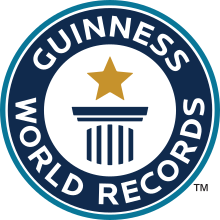
Back Guinness World Records Afrikaans موسوعة غينيس للأرقام القياسية Arabic ܫܛܪܐ ܬܐܒܝܠܝܐ ܕܓܝܢܝܣ ARC موسوعة جينيس للارقام القياسيه ARZ গিনিজ ৱৰ্ল্ড ৰেকৰ্ডছ Assamese Guinness World Records AST Ginnesin Rekordlar Kitabı Azerbaijani Гиннесстың рекордтар китабы Bashkir Guinness World Records BCL Кніга рэкордаў Гінэса Byelorussian
This article has multiple issues. Please help improve it or discuss these issues on the talk page. (Learn how and when to remove these messages)
|
 | |
| Editor | Craig Glenday[1] |
|---|---|
| Publisher | Jim Pattison Group |
| Publication place | United Kingdom[2] |
Published in English | 27 August 1955 – present |
| Media type |
|
| Website | guinnessworldrecords |
Guinness World Records, known from its inception in 1955 until 1999 as The Guinness Book of Records and in previous United States editions as The Guinness Book of World Records, is a British reference book published annually, listing world records both of human achievements and the extremes of the natural world. Sir Hugh Beaver created the concept, and twin brothers Norris and Ross McWhirter co-founded the book in London in August 1955.
The first edition topped the bestseller list in the United Kingdom by Christmas 1955. The following year the book was launched internationally, and as of the 2025 edition, it is now in its 70th year of publication, published in 100 countries and 40 languages, and maintains over 53,000 records in its database.
The international franchise has extended beyond print to include television series and museums. The popularity of the franchise has resulted in Guinness World Records becoming the primary international source for cataloguing and verification of a huge number of world records. The organisation employs record adjudicators to verify the authenticity of the setting and breaking of records.
Following a series of owners, the franchise has been owned by the Jim Pattison Group since 2008, with its headquarters moved to South Quay Plaza, Canary Wharf, London, in 2017. Since 2008, Guinness World Records has orientated its business model away from selling books, and towards creating new world records as publicity exercises for individuals and organisations, which has attracted criticism.
- ^ "Corporate". Guinness World Records. Archived from the original on 19 March 2010. Retrieved 19 October 2010.
- ^ "Guinness World Records". LinkedIn.